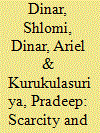|
|
|
Sort Order |
|
|
|
Items / Page
|
|
|
|
|
|
|
| Srl | Item |
| 1 |
ID:
183735


|
|
|
|
|
| Summary/Abstract |
This essay reviews ecological economist, Giorgos Kallis’ recent book, ‘Why Malthus Was Wrong and Why Environmentalists Should Care’ (2019) to review the debate around population and sustainability. In the name of sustainability and resource scarcity, debates on population tend to blame the poor without adequately problematizing structural inequalities that sustain racial capitalism and stimulate scarcity. This narrative is a remnant of the Malthusian thesis that problematized population growth in relation to food scarcity without problematizing utilitarian human wants. In this essay, I review this book because the author expands on the politics of scarcity and urges us to nurture ethics and the politics of limits. My contribution in this extended review comes in offering a perspective from post-colonial countries like India, and in the global South more broadly, that align with ‘other’ notions of limits, the good life, and sustainability.
|
|
|
|
|
|
|
|
|
|
|
|
|
|
|
|
| 2 |
ID:
106935


|
|
|
|
|
| Publication |
2011.
|
| Summary/Abstract |
Water scarcity is popularly associated with inter-state conflict, yet the academic literature also touts scarcity as an important variable for understanding cooperation over international freshwater. Building on studies that consider the relationship between scarcity and hydro-political cooperation, this paper empirically investigates why water treaties are negotiated for some rivers and between some riparians, and not others. Rather than considering a linear relationship between scarcity and cooperation, this study hypothesizes a curvilinear relationship expecting agreements to emerge in situations where scarcity is moderate rather than very low or high. Additional variables considered for understanding treaty formation include level of governance among the riparian states, prevailing power dynamics along the river, overall inter-riparian relations (measured by trade, diplomatic ties, and militarized disputes), and the geographical configuration of the entire river. The hypothesized curvilinear relationship between water scarcity and cooperation finds significant support in the empirical analyses. Governance, diplomatic relations, and trade are likewise found to be salient in explaining the levels of cooperation. The geographical configuration of the river was significant in only part of the estimates, and the militarized disputes variable was found to be insignificant across all models. Finally, while results confirm that cooperation may not depend on power asymmetries within riparian dyads, as suggested by some theories, the paper does find support for the contention that more developed states are in a position to provide incentives, such as financial transfers, to less-developed states so as to facilitate an international agreement.
|
|
|
|
|
|
|
|
|
|
|
|
|
|
|
|
|
|
|
|
|